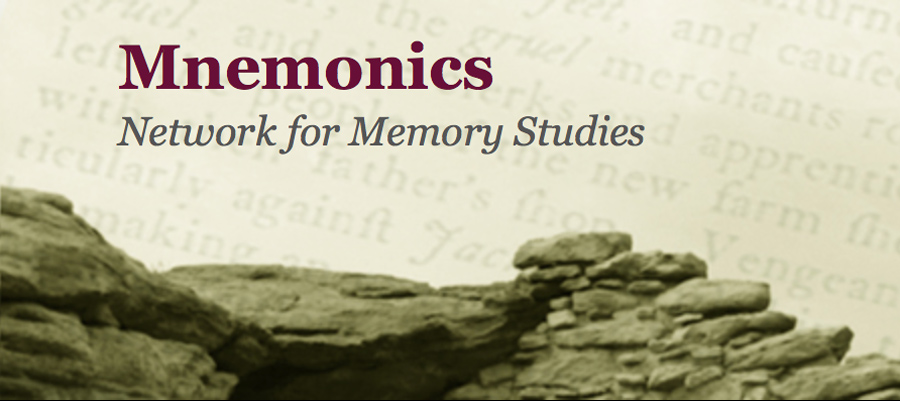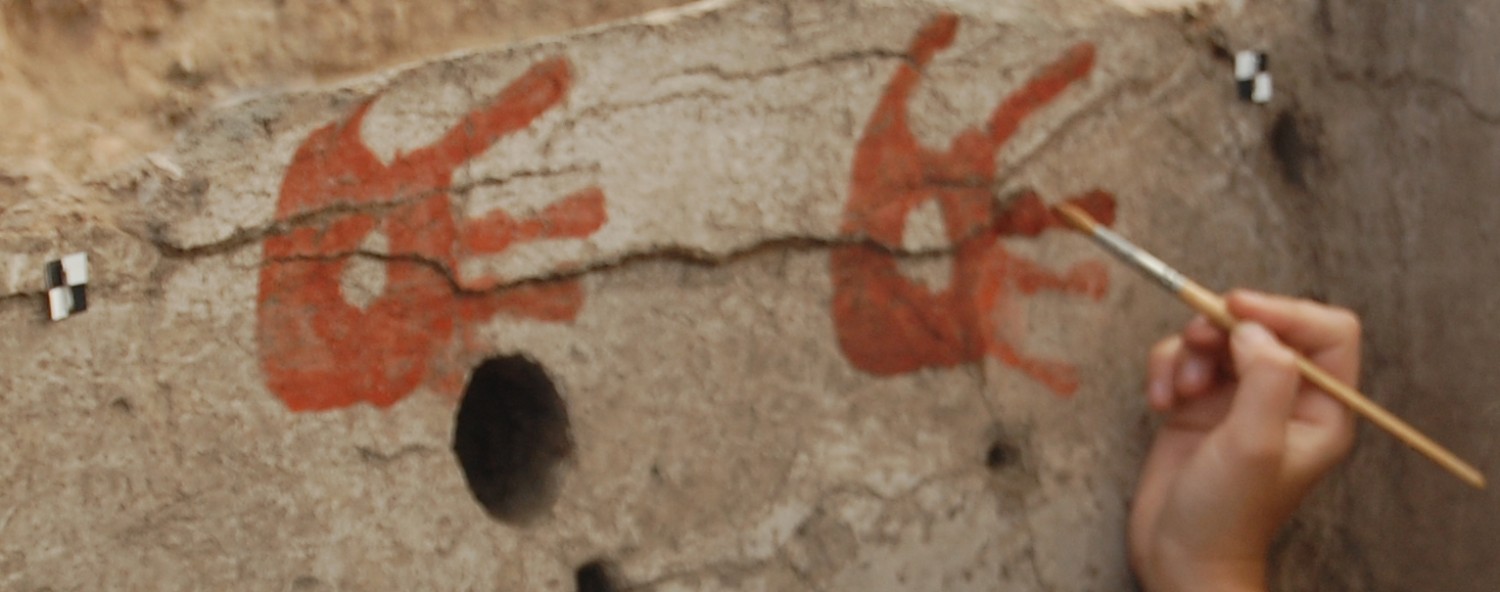
CFP Mnemonics Summer School “Memory and Materialism”
Event date: 8-10 September 2015
Location: King’s College London; Goldsmiths, University of London; and the University of Westminster

Mnemonics 2015: Call for Papers
For the fourth edition of its annual summer school, the Mnemonics network, an international collaborative initiative for graduate education in memory studies, invites paper proposals that address the relations between materialities and cultural memory.
The study of cultural memory is well versed in analysing the material traces of the past. From the manifold historical objects that continue to inhere in the present as artifacts, ruins, traces, or even present absences, to the ways in which different representational media frame contemporary understandings of particular events through those objects, the discourses of memory studies have proven adept at investigating the use, circulation, value, and affect of historical remnants in processes of cultural remembrance. However, memory studies has so far been less attentive to the actual materiality of these objects. Whether historical artifacts, remediated and recontextualised, function as memory texts within private or public spheres, or whether memory texts are manufactured after the events for which they stand, cultural memory studies tends to focus on the forms and mobilities of such items, rather than on their material constituents or properties – engendering a disconnection from the very history of materiality.
In contrast, the recent ‘material turn’ across the humanities and social sciences has seen the emergence of a number of critical movements (new materialism, speculative materialism, thing theory, and actor-network theory, to name just a few) that aim to foreground the agency, specificity, and affective capabilities of matter of all kinds. Highlighting the complex temporal, spatial, and material imbrications of human and non-human life and matter, these discourses suggest: firstly that materiality has a social life that is not necessarily acknowledged in the objects valued by memory studies; secondly, that although certain objects and materials are not currently considered of memorative importance, the social histories of their materialization may suggest or demand otherwise. It is these points of historical friction and contradiction that can reveal unseen historical processes and illuminate new dimensions of memory work.
Accordingly, Mnemonics 2015 seeks to unearth the materials and matter that have been overlooked by present regimes of cultural memory, in theory and practice. Examining the social, economic, and political concerns that enlist certain forms of matter in processes of enculturation, whilst excluding others from recognition as objects of memory, we ask: what turns a ‘thing’ into an historical artifact worthy of preservation and attention? What forms of (atmospheric, meteorological, geological, chemical, mineralogical) materiality are elided by current theories and practices of memory, and what social and cultural histories are marginalised by these occlusions? What kinds of social and historical processes accompany the transformation of apparently cultureless materials (resources, waste, rubble) into objects of remembrance? In what ways are existing forms of cultural memory mediated by and dependent upon invisible or unacknowledged forms of materiality? How might a materialist approach to memory studies enable us to improve our understanding of the myriad processes of circulation, exploitation, and transformation that underscore the enmeshment of human and non-human histories?
By tracking their historical and cultural trajectories, we aim to chart the ways in which materials change over time and usage, examining the processes through which matter may be made to assemble, disassemble, metamorphose, and even disappear, to reinforce or challenge hegemonic constructions of memory and history. With this in mind, the summer school welcomes paper proposals that explore the interface of materialism and memory. Possible topics include, but are emphatically not restricted to:
- the dematerialisation and rematerialisation of the past (its historical social relations, processes and events) in this era of post-industrialisation, digitisation, and hyper-mediatisation;
- memory, materiality and representation: how literary and cultural processes of remembrance overwrite or expose the material histories of memory objects;
- cultural memory studies, the Anthropocene and environmental crisis: for example, the geo-materialism of climate change; pollution and waste; the use of fossil-fuels and other natural resources;
- memory, materiality and affect (in, for example, psychological, spiritual and religious terms);
- memory, materiality and agency: the possibility of non-human agency, human-non-human agentic assemblage;
- memory, materiality, and identification: how the specific materialities of historical artifacts might anchor particular understandings of regionality, ethnicity, race, gender, sexuality, nationality, class, and so on;
- trajectories of material memory: the changing significance and use of historical objects in their mediation and remediation across time and space;
- assemblages of material memory: the cosmopolitan or multidirectional relations constructed between, or made visible by, particular materials of memory.
Confirmed Keynote Speakers
Professor Ursula K. Heise teaches in the Department of English and at the Institute of the Environment and Sustainability at UCLA. She is a 2011 Guggenheim Fellow and served as President of ASLE (Association for the Study of Literature and the Environment) in 2011. Her research and teaching focus on contemporary literature, environmental culture in the Americas, Western Europe and Japan, literature and science, globalization theory, and media theory. Her books include Chronoschisms: Time, Narrative, and Postmodernism (Cambridge University Press, 1997), Sense of Place and Sense of Planet: The Environmental Imagination of the Global (Oxford University Press, 2008), and Nach der Natur: Das Artensterben und die moderne Kultur (After Nature: Species Extinction and Modern Culture, Suhrkamp, 2010). She is editor of the bookseries, Literatures, Cultures, and the Environment with Palgrave-Macmillan and co-editor of the series Literature and Contemporary Thought with Routledge. She is currently finishing a book called Where the Wild Things Used to Be: Narrative, Database, and Endangered Species.
Professor Stef Craps is a research professor in English and American literature and culture at Ghent University, where he directs the Cultural Memory Studies Initiative (formerly the Centre for Literature and Trauma). He has held visiting fellowships at the School of Advanced Study, University of London; Birkbeck, University of London; Columbia University; and the Flemish Academic Centre for Science and the Arts (VLAC). He is the author of Postcolonial Witnessing: Trauma Out of Bounds (Palgrave Macmillan, 2013) and Trauma and Ethics in the Novels of Graham Swift: No Short-Cuts to Salvation (Sussex Academic Press, 2005), and has guest-edited special issues of Criticism: A Quarterly for Literature and the Arts (2011; with Michael Rothberg) and Studies in the Novel (2008; with Gert Buelens) on the topics of, respectively, transcultural negotiations of Holocaust memory and postcolonial trauma novels. He sits on the editorial boards of Atlantis, Journal of Literature and Trauma Studies, and Miscelánea: A Journal of English and American Studies. His next book projects are an introductory guide to the concept of trauma for Routledge’s New Critical Idiom series and an edited collection provisionally titled Memory Unbound: Tracing the Dynamics of Memory Studies (with Lucy Bond and Pieter Vermeulen).
Professor Alex Warwick is Head of the Department of English, Linguistics and Cultural Studies at the University of Westminster, where she works on the literature and culture of the nineteenth-century. Her research spans a wide range of topics from the Whitechapel Murders to apocalyptic urban imaginaries and the Victorian gothic. Alongside numerous journal articles and chapters, past publications include: Fashioning the Frames: Boundaries, Dress and the Body (Berg, 1998, with Dani Cavallaro), Oscar Wilde (Northcote House, 2007); edited collections on Repositioning Victorian Sciences: shifting centres in Nineteenth-Century Thinking (Anthem Press, 2006, with David Clifford, Elizabeth Wadge and Martin Willis), Jack the Ripper: Media, Culture, History (Manchester University Press, 2007, with Martin Willis), The Victorian Literature Handbook (Continuum, 2008, with Martin Willis), Mona Caird: the wing of azrael (Pickering & Chatto, 2010), Victorian Archaeology (University of Wales Press, 2012, with Martin Willis), and The Selected Writings of Andrew Lang Vols 1 and 2 (Edinburgh University Press, 2013, with Andrew Teverson and Leigh Wilson). Her current research and writing concerns the way in which the development of archaeology in the nineteenth-century impacted upon the Victorian imagination.
Dr Joanne Garde-Hansen is Associate Professor in Culture, Media and Communication in the Centre for Cultural Policy Studies at the University of Warwick. Her research and teaching focus upon two strands: media, memory, archives and heritage; and media, gender, emotion and ageing. Joanne is co-researcher on the AHRC-funded research network Women, Ageing and Media (with UWE and UoG) and co-investigator on the ESRC-funded Sustainable Flood Memories project (with UWE and CCRI) and the follow-up ESRC funded Knowledge Exchange project with the Environment Agency on Digital Stories of Flooding. She is currently working with colleagues in Sao Paulo, Brazil on the theory and practice of a social technology of media and memory. Recent books include: Save As…Digital Memories (Palgrave Macmillan 2009, co-edited with Andrew Hoskins and Anna Reading); Media and Memory (Edinburgh University Press, 2011); Geography and Memory (Palgrave Macmillan, 2012, co-edited with Owain Jones), Emotion Online: Theorizing Affect on the Internet (Palgrave Macmillan, 2013, co-authored with Kristyn Gorton), and Remembering Dennis Potter Through Fans, Extras and Archives (Palgrave Pivot, 2014).
Format
The Mnemonics summer school serves as an interactive forum in which junior and senior memory scholars meet in an informal and convivial setting to discuss each other’s work and to reflect on new developments in the field of memory studies. The objective is to help graduate students refine their research questions, strengthen the methodological and theoretical underpinnings of their projects, and gain further insight into current trends in memory scholarship.
Each of the three days of the summer school will start with a keynote lecture, followed by sessions consisting of three graduate student papers, responses, and extensive Q&A. In order to foster incisive and targeted feedback, all accepted papers will be pre-circulated among the participants and each presentation session will be chaired by a senior scholar who will also act as respondent.
Practical Information
Local organizers: The London Cultural Memory Consortium (LCMC) brings together scholars working in literature, culture and the creative industries at Goldsmiths, King’s College London, and the University of Westminster. Advocating a transdisciplinary and transcultural approach to the study of memory, the current research interests of the Consortium focus on the materiality of memory, particularly in relationship to emergent discourses surrounding biopolitics, environmentalism, climate change, and the Anthropocene. In 2013, the Consortium was launched with a conference on Memory and Restitution at the University of Westminster. Since 2014, the LCMC has been responsible for coordinating and coorganizing an ongoing series of colloquia under the rubric of the Natural History of Memory. These events, hosted across UK and European universities, have brought international scholars together to consider the manifold ways in which the material environment might be mobilized in and affected by diverse forms of historical violence.
Where: London: King’s College London; Goldsmiths, University of London; and the University of Westminster. The majority of the summer school will be held at King’s College London (Strand Campus), but there will be some sessions at Goldsmiths and Westminster. King’s College London student apartment-style accommodation will be provided for those who want it – details will be available when notices of acceptance are sent out to applicants.
The accommodation is 10-15 minutes or a short underground or overground train or bus ride from the main conference venue.
When: 8-10 September 2015
Fee: 250 pounds sterling, payable upon acceptance of paper proposal
Included: attendance; student accommodation for three nights in the city centre; all breakfasts, lunches, refreshments, and conference dinner.
Not included: travel
Or, 100 pounds sterling (excluding accommodation and breakfast).
Send: A 300-word abstract for a 15-minute paper (including title, presenter’s name, and institutional affiliation), a description of your graduate research project (one paragraph), and a short CV (max. one page) as a single Word document to: r.crownshaw@gold.ac.uk
Deadline: 1 April 2015
Notification of acceptance: 1 May 2015
Deadline for submission of paper drafts: 8 August 2015
Number of places: 24, 12 of which are reserved for the partner institutions/networks
About Mnemonics
Mnemonics: Network for Memory Studies is a collaborative initiative for graduate education in memory studies between the Danish Network for Cultural Memory Studies, the Swedish Memory Studies Network, the London Cultural Memory Consortium, and programmes at Ghent University (Belgium), Goethe University Frankfurt (Germany), the University of Illinois at Urbana-Champaign (USA), and Columbia University (USA, associate partner).
Mnemonics organizes an annual summer school around specific themes in memory studies, hosted by each of the partners in turn and lasting three intensive days. Graduate students affiliated with the partner institutions and a number of students external to the network are given the opportunity to present and receive feedback on their research projects. Faculty from all of the partner institutions participate in the discussions, and prominent invited speakers bring their perspectives to the debates.
Here is a list of past and upcoming editions with locations and topics:
2012: Aarhus – Aesthetics and Ethics of Memory
2013: Ghent – Memory Unbound
2014: Stockholm – Media of Memory
2015: London – Memory and Materialism
2016: Urbana-Champaign – (tba)
2017: Frankfurt – (tba)
Further information about the network is available from the Mnemonics website at http://mnemonics.ugent.be/.
Mnemonics on Facebook: http://www.facebook.com/groups/mnemonics.network/
Mnemonics on Twitter: @mnemonics_net

